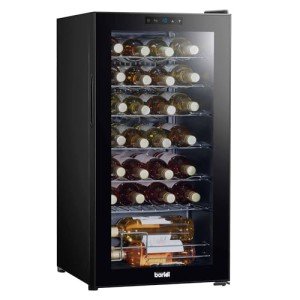It's A Buy Fridge Success Story You'll Never Be Able To
A Comprehensive Guide to Buying a Fridge: Tips and Considerations
Buying a refrigerator is a significant choice for any household. The ideal fridge not just keeps your food fresh however also enhances the visual appeal of your kitchen area. With a plethora of options offered in the market, potential buyers face the obstacle of discovering a refrigerator that suits their requirements and fits their budget. Phylicia Stinson provides valuable insights into the essential factors to think about when purchasing a fridge, categorizes the various types offered, and responds to some frequently asked concerns.
Kinds of Refrigerators
Before diving into the purchasing procedure, it's important to comprehend the various kinds of fridges available. Each type serves a special function and features its own set of features. Here's a fast introduction:
Type
Description
Ideal For
Leading Freezer
A conventional design with the freezer compartment on top.
Budget-conscious customers.
Bottom Freezer
Refrigerator above, freezer at the bottom.
Those who regularly access fresh food.
Side-by-Side
Two vertical areas, one for the fridge, one for the freezer.
Large households with diverse storage requirements.
French Door
Separate compartments for fridge and freezer with wide doors.
Stylish kitchen areas and devoted cooks.
Compact
Smaller and portable, appropriate for restricted spaces.
Dormitories or little houses.
Smart Fridges
Equipped with Wi-Fi and touch screens for sophisticated functions.
Tech-savvy users seeking convenience.
Understanding these various types can assist buyers pinpoint what fits their way of life and cooking area layout best.
Key Considerations When Buying a Fridge
1. Size and Space
The size of the refrigerator is among the vital elements to think about. Measure the offered area in your kitchen where the fridge will live. Remember:
- Depth, Width, and Height: Ensure that the fridge matches your cooking area's total design.
- Door Swing: Check that the door can open freely without blockage.
- Capacity Needs: Consider how much food you generally store and choose a fridge with a proper cubic foot capacity.
2. Energy Efficiency
When buying a new fridge, try to find energy-efficient models. Energy Star-rated fridges take in less electrical energy, which can significantly lower utility costs. Factors to assess consist of:
- Energy Guide Label: This provides a price quote of the yearly energy usage.
- Inverter Technology: Helps keep temperature level while taking in less power.
3. Features and Technology
Refrigerators feature a myriad of functions and technological developments. Selecting the best mix can significantly enhance convenience:
- Temperature Control: Look for designs that use precise temperature level settings for different compartments.
- Smart Technology: Wi-Fi connection can provide signals, recipe ideas, and stock checks.
- Ice and Water Dispenser: Consider whether you want an in-door water and ice dispenser to conserve space and boost ease of access.
4. Design and Design
The visual appeal of your refrigerator can complement the total kitchen area design. Think about the following designs:
- Finish Choices: Stainless steel, matte black, and classic white are popular finishes.
- Deal with Design: Choose a handle design that matches your kitchen's decoration and is easy to open.
5. Cost and Brand Reliability
While there are lots of spending plan alternatives offered, purchasing a trustworthy brand frequently equates to reliability and resilience. Consider the following:
- Warranty: A strong guarantee can secure against flaws and failures.
- Client Reviews: Research user feedback to evaluate performance and service quality.
Purchasing Tips
- Research: Spend time checking out evaluations and contrasts before deciding.
- Sales and Promotions: Look out for sales throughout holidays or unique occasions to improve deals.
- In-store Experience: Visit regional appliance shops to see the designs face to face and ask questions to experienced staff.
Frequently asked questions about Buying a Fridge
1. For how long can I expect my refrigerator to last?
On average, a refrigerator lasts between 10 to 20 years, depending on the brand name and upkeep. Routine upkeep can extend its lifespan.
2. What should I do if my refrigerator isn't cooling properly?
Start by inspecting the temperature level settings, guarantee the door seals are undamaged, and keep the coils clean. If concerns persist, speak with a professional specialist.
3. Are clever fridges worth the financial investment?
Smart fridges can be beneficial for tech-savvy users and those who value benefit. Functions like inventory management and remote access can save time and minimize food waste.
4. How do I correctly preserve my refrigerator?
- Clean the interior routinely to get rid of spills and odors.
- Defrost if you experience frost accumulation.
- Examine the door seals to ensure they are clean and practical.
5. What is the best refrigerator brand?
There is no one-size-fits-all answer. However, brands like Whirlpool, Samsung, LG, and Frigidaire are typically appreciated for quality and customer care.
Eventually, purchasing a refrigerator includes much more than simply picking a random model off the rack. By making the effort to assess your needs, assessing type options, understanding important features, and considering design aesthetic appeals, you can make an informed choice that will serve your household well for several years to come. With the right option, your refrigerator will be a dependable buddy in your day-to-day kitchen operations.
